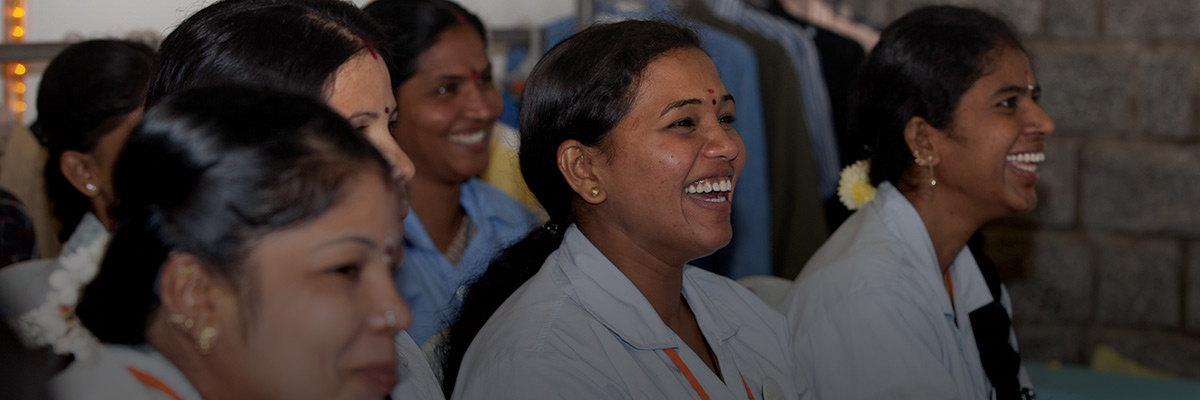Changing Lives Through The HERProject
Posted on 10 July, 2020

It is no secret that global supply chains are a major employer of women; indeed, women represent an average of 68% of the garment workforce and 45% of the textile sector workforce.
These low-income working women often face significant and specific challenges, such as a low status in the workplace, low skill levels, irregular and excessive hours, harassment, violence, and discrimination; these challenges are reinforced by a lower status in society. It is a fact that some female factory workers are vulnerable due to low educational levels and live away from their families in rented premises and are mainly migrants from rural areas.
The Ready Made Garment industry provides women access to a formal economy, stable employment, and some measure of social security and social acceptability, but in spite of these opportunities for advancement, women workers are still at risk of different forms of harassment in the workplace. Many female workers also experience violence at home and in their community.
Factory middle management, mostly men, do not possess essential skills to manage workplace relationships; they also have difficulty behaving appropriately in a high-pressure environment. Moreover, factory management needs more support in strengthening factory policies and systems to protect and promote workers’ well-being. Positive working relationships and empowered workers are inextricably linked to higher productivity and sustainable supply chains.
To help enable these women to take greater control of their lives, and ensure that they can make and act on the choices that they value, Dimensions is proud to collaborate with Business for Social Responsibility (BSR) in implementing the HERproject.
The HERproject is the leading collaborative effort to empower low-income women at work, reaching over 800,000 women workers in numerous countries: Bangladesh, Egypt, Kenya, China, India, Pakistan, Cambodia, Indonesia & Vietnam. The HERproject predominantly focuses on building women’s awareness in the supply chain on their health, financial and gender equality needs through three programmes:
- HERrespect provides targeted workplace-based training over a 12-month period. HERrespect raises gender awareness among management and workers and builds their skills to prevent and address harassment. The training activities, materials, and impacts are locally driven and respond to local needs.
- HERhealth increases women’s health awareness and gives access to health services through sustainable workplace programmes.
- HERfinance helps to build financial knowledge of low income workers by delivering workplace financial educational programmes and connecting facility employees to suitable financial services.
Through the HERproject we can change the lives of the women who work in the supply base and we are actively engaged with the HERproject as a key part of our business strategy.
Dimensions has successfully implemented the HERrespect programme into two Bangladeshi suppliers reaching over 4000 workers. The programme has had great success in the two factories with awareness on gender equality and harassment in the workplace, community and home improving dramatically.
We will continue to work with suppliers to ensure the principles of the programme have longevity and the workers and management systems continue to develop and grow. We intend to expand our involvement with HERhealth further around the global supply chain, impacting women, families and communities whilst building management relationships.
Participating in the HERfinance programme enables low-income workers to have access to easy to understand information about personal finance in a culturally relevant manner through a series of brief workshops that take place in the workplace. Some of these employees are then selected as peer educators for the rest of the workforce and for their local communities. This project creates a powerful ripple effect along existing communication networks with 77% of workers sharing information they learned from their peers.
Taking part in this programme enhances the lives of both the men and women who work in the supply chain. Since running this project, facilities that have taken part have seen a reduction in absenteeism, increased productivity, increased cleanliness of the facility, increased use of PPE and improved worker – management relationships.
Recent Articles
FutureFest 2025: A Day of Adventure with the Greggs Foundation
Dimensions Secures Exciting New Partnership with Avis Budget Group for Bespoke Uniform Range
Future Hotel Manager Leila Gets Her Very Own Mini Uniform (and Teddy!)
Dimensions Donates 40 Pairs of Shoes to Support Children in Need
A First Look at the New Nationwide Uniform With a Bit of Show and Tell